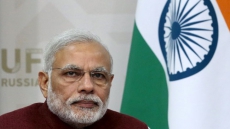India's decision to build its own space station is the next logical step after its human space mission Gaganyaan, former chiefs of Indian space agency said on Thursday.
They also said space stations can also double up as earth observation satellites with installation of necessary instruments like cameras.
Simply put, a space station is a manned satellite in a low earth orbit.
On Thursday, Indian Space Research Organisation (ISRO) Chairman K.Sivan told reporters in New Delhi that "India will set up its separate space station in the next 5-7 years after Gangayaan is successfully completely in 2022."
The space station, which is estimated to weigh around 20 tonnes, would be an extension of the Gaganyaan mission -- India's first manned mission into space, he said.
According to Sivan, the space station will most likely be used to conduct microgravity experiments.
The ISRO chief said that the preliminary plan for the space station is to accommodate astronauts for up to 15-20 days in space, but specific details will emerge after the Gaganyaan, is complete.
Earlier, India did not look at manned missions and other projects as the cost-benefit ratio was not in favour and hence the focus was on launching communication and remote sensing satellites.
"India moving forward to build its own space station is the logical step. It is a major step forward in space technology," former ISRO chief K. Radhakrishan told IANS.
He said Gaganyaan - India's human space exploration mission - is the beginning.
"Now one has to develop the knowledge/technology for having Indians in the space for longer duration and to carry out scientific experiments," Radhakrishnan added.
Welcoming Sivan's announcement, another former ISRO chief Madhavan Nair told IANS: "Once the space capsule is developed, the next steps towards building the space station will be simple."
However, both of them were not able to put a time frame for India to be ready to set up its own space station.
Queried about the availability of a rocket to carry the heavy load for setting up the space station, Nair said: "The GSLV Mk III (Geosynchronous Satellite Launch Vehicle Mark III) rocket can carry up to 10 tons into lower orbit. Space stations are built in the lower earth orbit."
"With the addition of necessary instruments like camera, the space station can observe the earth. With humans manning the space station, the quality of image can also be better as what need to be looked could be looked in detail," he added.
According to Nair, there will be cost saving in terms of launching earth observation/remote sensing satellites.
Speaking to IANS some years back, M.Y.S. Prasad, who retired as director of the Satish Dhawan Space Centre, had stressed that India should have long-term strategic goals that will have a cascading technological benefit across several areas.
India should actively get into building its own space station in the low earth orbit as its next space frontier since the time is opportune for this, he then said.
"It is time to look 10-15 years ahead rather than planning for incremental growth activities. Building our own space station will be beneficial on many counts and would also generate around 15,000 high-skilled jobs," Prasad then said.
The decision to have a space station will have a positive effect on other connected projects. The plan to have a space station will result in accelerated development of reusable rockets, in-orbit docking systems, manned mission and others.
The research and development (R&D) activities in these areas need the evolution of re-entry technologies, life support systems, safe recovery systems, more reliable launch and spacecraft systems, long-term platforms operating in space for specialised experiments and others, Prasad then said.
